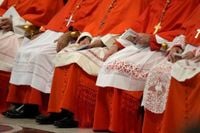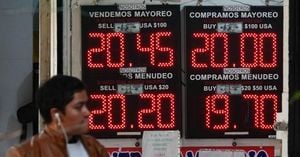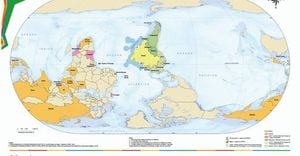On Wednesday, May 7, 2025, the conclave to elect the new pope began, following the death of Pope Francis just weeks earlier. A total of 133 cardinal electors gathered in the Sistine Chapel to undertake this solemn responsibility, which is cloaked in secrecy and tradition. The cardinals, representing 71 different countries, are tasked with selecting the successor of the first Latin American pope, who passed away on April 21 at the age of 88.
The conclave officially commenced at 4:30 PM local time, following a mass held earlier in St. Peter's Basilica. Cardinal Giovanni Battista Re presided over the mass, invoking the Holy Spirit to guide the cardinals in their decision-making process. He expressed a heartfelt wish, stating, "May God grant the Church the pope who best knows how to awaken the consciences of all."
Before the conclave, the cardinals participated in preliminary meetings, where they sought to identify potential candidates who could not only succeed Pope Francis but also ensure the Catholic Church remains credible and relevant, especially to younger generations. The cardinals come from diverse backgrounds, but they share a common goal: to find a leader who can unite the Church and preach peace.
In a significant departure from past practices, the cardinals have surrendered their electronic devices to maintain the confidentiality of their discussions. This precaution reflects a strong commitment to the tradition of secrecy surrounding the conclave. As the cardinals prepare to cast their votes, the Vatican has also implemented measures to disable mobile phone signals within its borders, enhancing the isolation necessary for the conclave.
The voting process is intricate and can be lengthy, with cardinals casting ballots in four rounds each day until a candidate secures a two-thirds majority, which in this case means 89 votes. If no consensus is reached, the ballots are burned, producing black smoke, while white smoke will signal the election of a new pope.
As the cardinals gather in the Sistine Chapel, there is a palpable sense of anticipation. The conclave is expected to last as long as necessary, potentially days or even weeks, until a new pope is elected. The last conclave, which took place in 2013, lasted just over two days before Pope Francis was chosen.
Historically, the conclave has seen varying degrees of influence from different factions within the Church. Current discussions suggest some groups within the College of Cardinals are advocating for a pope who diverges significantly from the progressive path set by Pope Francis. This internal politics has intensified as factions distribute information to sway certain candidates.
Among the 133 electors, approximately 80% were appointed directly by Pope Francis, suggesting a continuity of his vision could be favored. However, the dynamics of the conclave could lead to unexpected outcomes, as cardinals navigate their complex relationships and differing priorities.
Cardinal Fernando Chomali of Chile, prior to entering the conclave, urged the faithful to pray for the cardinals, stating, "Pray for us to do God's will." His message reflects the gravity of the task at hand and the hope that divine guidance will lead to the right choice for the Church.
As the cardinals prepare for their deliberations, the Vatican has also revealed details about the attire that the new pope will wear. The 'Hall of Tears,' a room adjacent to the Sistine Chapel, has been prepared with different sizes of papal vestments, ensuring that the new leader will be properly outfitted upon election.
In a unique twist, the betting markets have shown significant interest in the conclave, with approximately $19 million wagered on potential candidates. The frontrunners include Cardinal Pietro Parolin, Cardinal Luis Tagle, and Cardinal Peter Turkson, each of whom represents different factions and visions for the future of the Church.
As the conclave unfolds, the cardinals are also acutely aware of the global issues facing the Church. In a recent statement, they called for peace in Ukraine, the Middle East, and other regions plagued by conflict, emphasizing their role not just as spiritual leaders but as advocates for peace and justice in the world.
The conclave marks a historic moment for the Catholic Church, with the potential for significant shifts in direction and leadership style. As the world watches, the cardinals will engage in a sacred process that has shaped the Church for centuries, hoping to emerge with a leader who can navigate the complexities of modern faith and society.
In the coming days, the outcome of the conclave will be communicated to the public through the traditional smoke signals from the Vatican chimney, a practice that has become synonymous with papal elections. The anticipation is high as the faithful around the globe await news of their new spiritual leader.
As the cardinals gather under the watchful eyes of Michelangelo's frescoes, their task remains clear: to choose a pope who can inspire and lead the Church into a new era, one that resonates with the needs and aspirations of over 1.4 billion Catholics worldwide.




